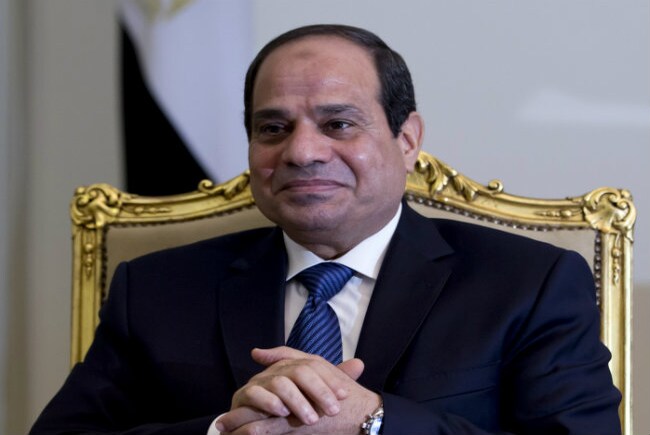
Critics say President Abdel Fattah al-Sisi has undermined freedoms gained after the 2011 uprising that toppled autocrat Hosni Mubarak.
Cair:
Egypt will hold a long-awaited parliamentary election in two phases starting on March 22-23, the Election Commission said on Thursday, something the government hopes will deliver political and economic stability after nearly four years of upheaval.
The most populous Arab country has been without a parliament since June 2012, when a court dissolved the democratically elected main chamber, reversing a major accomplishment of the 2011 uprising that toppled autocrat Hosni Mubarak.
The parliamentary election is the final step in a political roadmap the army announced in July 2013 after ousting Islamist Mohamed Mursi - Egypt's first democratically elected President - following mass protests against his troubled rule.
The second phase of the poll will be held on April 26-27.
Egyptian leaders say the parliamentary election shows their commitment to democracy.
Critics say President Abdel Fattah al-Sisi, who as army chief toppled Mursi, has undermined freedoms gained after the uprising that ended 30 years of autocratic rule under Mubarak.
In the absence of parliament, Sisi has wielded legislative authority used to introduce economic reforms that have impressed investors, while also curtailing political freedoms.
The People's Assembly is comprised of 567 seats, with 420 elected as individuals and 120 through winner-takes-all lists with quotas for women, Christians and youth. The remaining seats are appointed by the president.
Some political parties decry the emphasis on individuals as a throwback to Mubarak-style politics, which often favoured candidates with wealth and family connections.
With Mubarak's National Democratic Party gone, loyalists have scrambled to form alliances to secure Sisi a sizeable bloc of support.
The Popular Current, a political movement led by former Presidential candidate Hamdeen Sabahi, has said it will boycott the parliamentary poll to protest against the political climate.
Critics say Sisi has been delaying elections in order to consolidate his rule. But many Egyptians see him as a strong leader who can help the country recover.
If Egypt has to resort to runoffs, the election process could drag on until early May.
Egypt is seeking to win back foreign investors and tourists scared off by instability and an Islamist insurgency based mostly in the lawless Sinai Peninsula bordering Israel.
Since Mursi's ouster, authorities have cracked down on his Muslim Brotherhood movement, killing hundreds of supporters and arresting thousands. A court has barred the Brotherhood from contesting the election.
Secular and liberal activists have also been thrown in jail on charges of violating a law passed in 2013 that severely restricts protests.
The most populous Arab country has been without a parliament since June 2012, when a court dissolved the democratically elected main chamber, reversing a major accomplishment of the 2011 uprising that toppled autocrat Hosni Mubarak.
The parliamentary election is the final step in a political roadmap the army announced in July 2013 after ousting Islamist Mohamed Mursi - Egypt's first democratically elected President - following mass protests against his troubled rule.
The second phase of the poll will be held on April 26-27.
Egyptian leaders say the parliamentary election shows their commitment to democracy.
Critics say President Abdel Fattah al-Sisi, who as army chief toppled Mursi, has undermined freedoms gained after the uprising that ended 30 years of autocratic rule under Mubarak.
In the absence of parliament, Sisi has wielded legislative authority used to introduce economic reforms that have impressed investors, while also curtailing political freedoms.
The People's Assembly is comprised of 567 seats, with 420 elected as individuals and 120 through winner-takes-all lists with quotas for women, Christians and youth. The remaining seats are appointed by the president.
Some political parties decry the emphasis on individuals as a throwback to Mubarak-style politics, which often favoured candidates with wealth and family connections.
With Mubarak's National Democratic Party gone, loyalists have scrambled to form alliances to secure Sisi a sizeable bloc of support.
The Popular Current, a political movement led by former Presidential candidate Hamdeen Sabahi, has said it will boycott the parliamentary poll to protest against the political climate.
Critics say Sisi has been delaying elections in order to consolidate his rule. But many Egyptians see him as a strong leader who can help the country recover.
If Egypt has to resort to runoffs, the election process could drag on until early May.
Egypt is seeking to win back foreign investors and tourists scared off by instability and an Islamist insurgency based mostly in the lawless Sinai Peninsula bordering Israel.
Since Mursi's ouster, authorities have cracked down on his Muslim Brotherhood movement, killing hundreds of supporters and arresting thousands. A court has barred the Brotherhood from contesting the election.
Secular and liberal activists have also been thrown in jail on charges of violating a law passed in 2013 that severely restricts protests.
© Thomson Reuters 2015
Track Latest News Live on NDTV.com and get news updates from India and around the world

